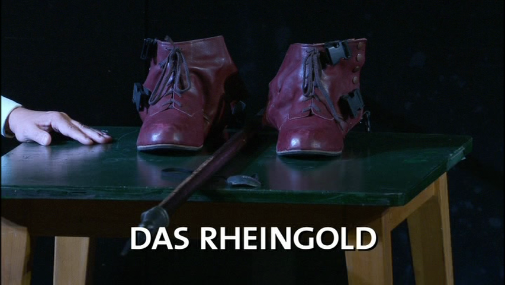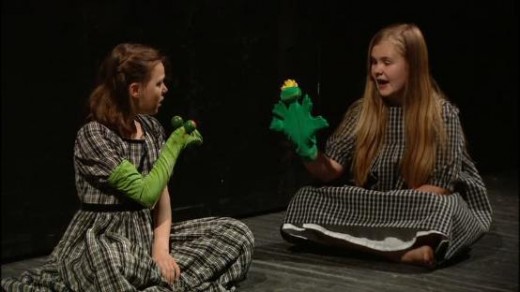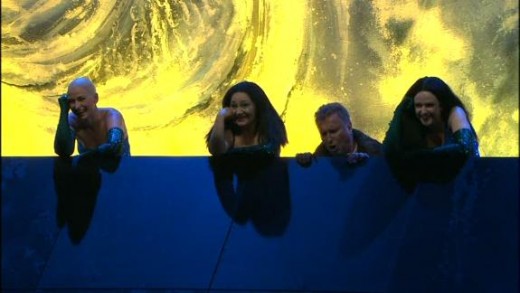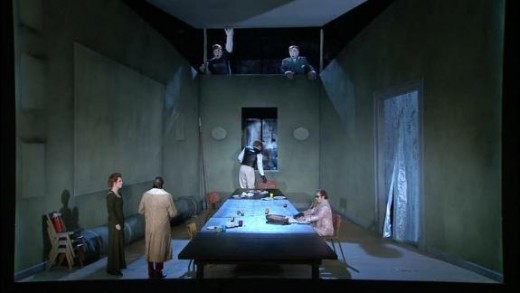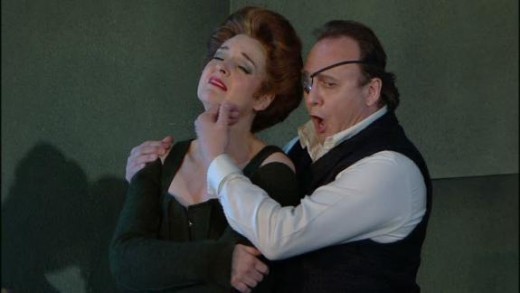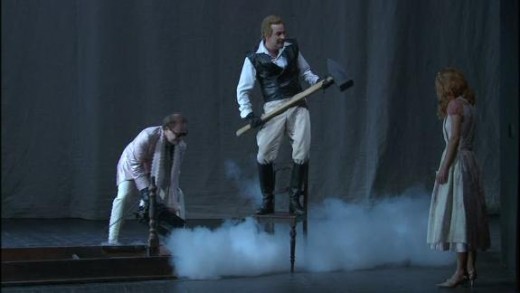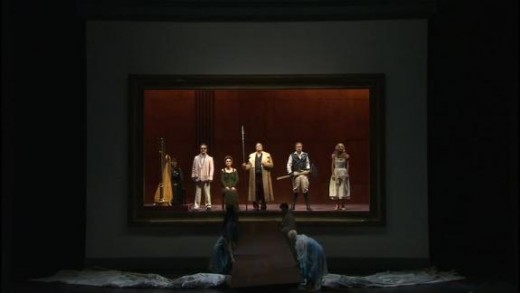The ArtHaus Musik DVD of the Deutsches Nationaltheater/Staatskapelle Weimar production of Wagner’s Das Rheingold, stage directed by Michael Shulz, begins with a long still shot:
That’s right, this interpretation of Wagner’s epic 19-hour cycle kicks off with a long static shot of… some dirty red boots. It’s gonna be a long Gesamtkunstwerk.
A momentary ray of hope comes as conductor Carl St. Clair takes the podium and prepares to conduct the gorgeous rippling E-flat major chord of the Rheingold prelude and we remember that, regardless of the production, we’re going to hear some of the most glorious music ever composed. But after the applause, the lights black out, and, well, and, well, and, well:
Shulz has chosen the audience-alienating path of leading with his weakest idea. Before the orchestra plays a note, three little girls in checkered dresses skip onstage with sock puppets on their arms and, after a brief and inexplicable quacking session, woodenly speak the story of the Ring to one another with the drama and technique of a non-Equity road show company of Annie. Some of the final lines indicate that perhaps these children are supposed to represent the Norns (there are some references to weaving). Just as I was beginning to fear that the entire opera would be quacked out via hand puppet, they skip offstage and, blessedly, the music begins. *
[* La Cieca the smartypants here will note that she previewed bits of this DVD and it seems to her the text of the “little girls” scene is in fact an early version of the Norns’ scene from — as it was then called — Siegfrieds Tod.]
If the rest of the production is not successful, the fact that Shulz allows us to at least hear music rather than child acting for the duration of the opera is in itself a relief. This is a modern-dress interpretation loosely structured around the thesis that humanity’s idols are as flawed and petty as the rest of us, certainly a logical and valid interpretation of the work, but the production is not cohesive and is cluttered with enough distracting bits of stage business and costuming that the theme never really resonates the way it could.
Most distressingly, the directorial choices are so odd and distancing that it’s difficult to focus on the music; some of the vocal performances are solid but none are exactly thrilling. While it’s impossible to suppress the majesty and power of Wagner’s composition, Shulz and the singers seem to be trying their best to do just that to serve the theme of this production.
A few of the staging devices work very well. The most interesting in Shulz’s placing of Wotan (Mario Hoff) in the opening scene, egging Alberich on as the Rhinemaidens (in sequined gloves and gowns suggesting a gilled version of the Supremes) campily flirt with him. Once Alberich has set off to get the Rheingold, Wotan slips unnoticed into the grim Eastern European conference room the gods are calling home at the beginning of Act 2 while the rest of the gods are asleep.
The suggestion that a suicidal Wotan deliberately set in motion his eventual undoing is interesting, and I’m curious to see how Shulz sustains this idea through the rest of the cycle. Hoff’s Wotan is surprisingly thin-voiced and ineffectual from the beginning, but that seems to be what the concept requires of him; my concern is that it seems to give him little to play as he develops into the broken, elderly Wotan of Siegfried.
There are more flashes of cleverness in the staging: later in Act 2, when the giants (Renatus Meszar, who manages to sing beautifully and create a sympathetic Fasolt from under an enormous amount of prosthetics, and Hidekazu Tsumaya) arrive seeking payment, they literally rip off the ceiling to make their entrance.
When Erda (gorgeously and powerfully sung by Nadine Weissmann) interrupts the action in Act 4 with her warning to Wotan, she draws a velvet curtain across the stage so she can address him privately in front of it. It’s a welcome change from the various productions that have Erda pop out of the ground like a prehistoric Whack-a-Mole while the rest of the characters pretend not to notice.
Mime (here, a janitor tasked with endlessly Windexing eight enormous crates labeled R-H-E-I-N-G-O-L-D) is well-sung by Frieder Aurich, who also manages an oddly dignified, committed performance even though Shulz doesn’t even try with the tarnhelm scene (Loge – a campy, mincing, sweet-voiced Erin Caves – and Wotan just walk around him pretending to be invisible.)
Tomas Möwes plays Alberich as a soulless manipulator who kneels with boots on his knees when he wants to appear pathetic. His voice, which is strong but worn and lacking the bestial dignity of the most compelling Alberichs, serves this interpretation well without being pleasant to listen to.
The singers playing the other gods have been directed to perform their characters ironically. Freya (Marietta Zumbült), blonde and dressed a bit like Little Red Riding Hood, looks completely bored by everything except her magic apples (which she’s constantly chomping, perhaps like a 21st-century Botox addict).
Christine Hansmann, who plays Fricka in a Victorian hairstyle and a corset with sleeves attached (believe it!), physically suggests Broadway belter Patti LuPone doing Chekhov. Unfortunately, her singing is wavering and shrill, and her acting – particularly a swoon at the end of Act 2 – also suggests, well, Patti LuPone doing Chekhov.
Froh (here a Palm Beach coke dealer, played by Jean-Noel Briend) and Donner (an aging leather daddy, played by Alexander Günther) also seem completely bored and ineffectual throughout, especially at the end when they use a smoke machine and some lazy hammer-waves to summon Valhalla.
Their efforts are so ineffective that a group of visible stagehands are eventually called in to build the rainbow bridge (here, an oak plank) themselves.
In the end, the gods (and a single harpist) are assembled in their new home, which here is a picture frame containing the sort of paneling traditionally found in a modern concert hall. The staging highlights the contrast between the controlled final image of powerful, wise leaders and the bored, inept people we’ve been watching for two and a half hours.
I have to admit that despite the excesses and lunacy of the rest of the opera (I didn’t even mention how the Nibelungs are Amish women or how one of the Rhinemaidens tosses her wig at Alberich like a stripper’s glove), the fact that there is a new Ring on DVD and that the director seems to have at least one good idea makes me interested enough to watch the next three segments. (I reserve the right to revise this opinion if Die Walküre opens with little girls quacking “hojotoho” at each other’s hands.)
